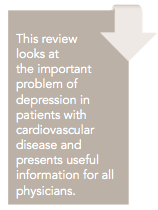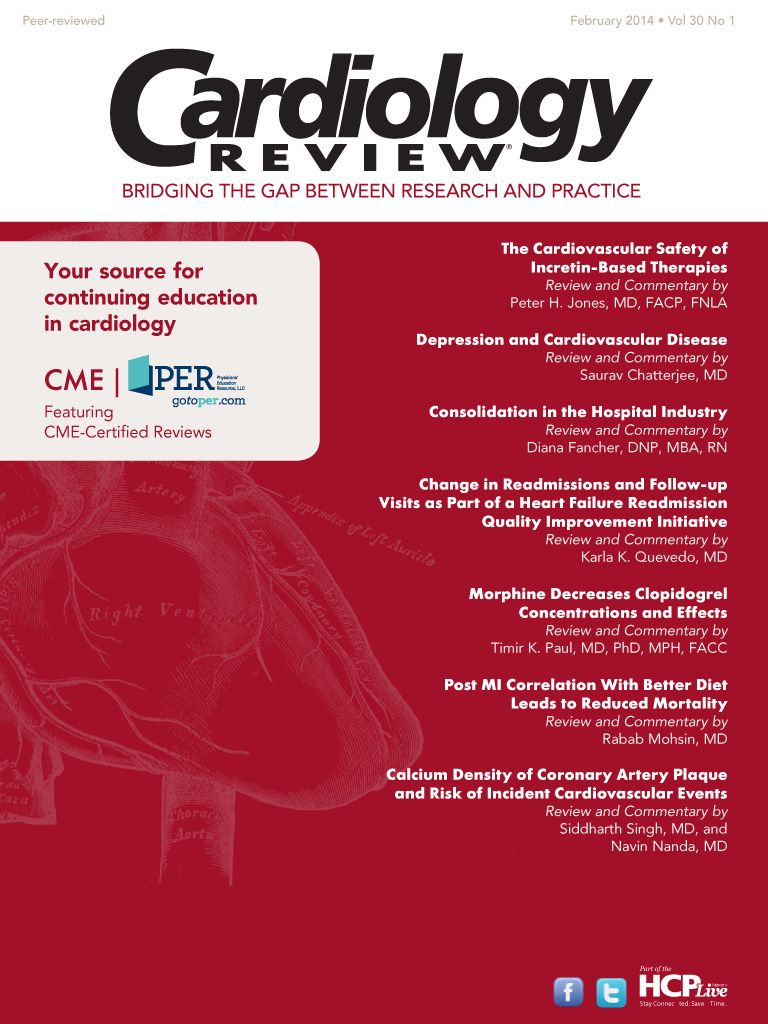Publication
Article
Cardiology Review® Online
Depression and Cardiovascular Disease
Author(s):
This review looks at the important problem of depression in patients with cardiovascular disease and presents useful information for all physicians.

Saurav Chatterjee, MD
Review
. Eur Heart J.
Hare DL, Toukhsati SR, Johansson P, Jaarsma T. Depression and cardiovascular disease: a clinical review2013. doi:10.1093/eurheart/eht462.

T
Diagnostic and Statistical Manual of Mental Disorders (DSM-IV)
he authors of this review attempt to delineate the management options and strategies for the treatment of depression in patients with cardiovascular disease (CVD). As they note, depression in the setting of a serious medical condition is quite prevalent, and requires focused treatment to obtain optimal clinical outcomes, as well as to improve the quality of life and sense of well-being in the setting of a protracted course of an acute illness or chronic disease. The authors cite the manual of the American Psychiatric Association to identify the spectrum of mood and affective disorders concomitantly seen with CVD, which include dysthymia (a disorder of mood), grief (a reaction to loss), adjustment disorder with depressed mood (a time-limited reaction to an event), or major depressive disorder (MDD, with a greater number and severity of symptoms associated with depression). The authors duly indicate the significant association seen between depression and increased incidence of CVD as well as worse outcomes. The correlation between depression and incident CVD as well as worse outcomes is well known, and depression as an exposure has been noted to be associated with CVD in a graded fashion: the more severe the depression, the higher the subsequent risk of mortality and other cardiovascular events.
In an effort to classify depression as an important marker of CVD, the authors have also outlined plausible biological pathways that may contribute to these effects: alterations in the autonomic nervous system, platelet receptors, and function; coagulopathic factors such as plasminogen activator inhibitor-1 and fibrinogen; proinflammatory cytokines; endothelial function; neurohormonal factors; and genetic linkages such as serotonin transporter mechanisms. There is an interesting reference to possible ways of managing depression in cardiac events—namely, cardiac rehabilitation and exercise therapy, cognitive behavioral therapy, various disease management programs, and finally pharmacotherapy. Interestingly, the authors noted that the only modality showing evidence of both safety and efficacy appeared to be cardiac rehabilitation and exercise therapy, indicating an unmet need for expansion and accessibility of these services. The authors also mention that the key components of successful rehabilitation programs include reassurance, education, and exercise. At the same time, simultaneous risks of nonadherence to medications, as well as nonmedical interventions, remain a real concern for CVD patients with depression.
Among medications, the class with the best side-effect profile as well as the most robust evidence of efficacy in depression remains the selective serotonin reuptake inhibitors (SSRIs). There is objective evidence of benefit of switching from one to another antidepressant if the first is either not tolerated or fails to produce remission of depressive symptoms. However, pragmatism would suggest that those with more severe or recurrent depression may need referral for formal psychiatric consultation. An important note of caution was included about using antidepressants (almost all of which affect the QTc) in patients with heart failure and a prolonged QTc. Likely benefits of a combined approach using pharmacotherapy as well as nonpharmacologic interventions appear evident. The authors conclude with a brief overview of different screening tools for diagnosing depression and a call for further research in this rapidly evolving arena.
CommentaryDepression Affects Many Aspects of CVD
F
rasure-Smith and colleagues1 published a landmark study in 1993 demonstrating that patients who are depressed at the time of an acute myocardial infarction (MI) have markedly elevated mortality compared with a nondepressed minority cohort. Since then, multiple studies have provided evidence that depression is amply prevalent (15%-35%) in populations with CVD, is predictive of developing CVD, and is a marker of adverse outcomes among CVD patients.2 Patients with depression have been noted to have a high sympathetic tone, hypercortisolemia, elevated catecholamine levels, abnormal platelet activation, increased inflammatory markers, and endothelial dysfunction.2 Importantly, these physiological derangements are present in depressed patients who do not have cardiac disease (ie, these mechanisms are linked to depression itself), and even when not actively depressed, patients with a history of depression have platelet activation that is comparable to patients who are depressed.3 Among the proposed mechanisms that have been suggested to elucidate the depression-CVD link is the stress-response hypothesis. It has been seen that patients with depression are in a constant state of perceived stress,4 with continuous upregulation of the hypothalamo-pituitary-adrenal and sympatho-adrenal systems, which in turn may lead to the observed downstream abnormalities in platelet function, autonomic tone, inflammation, and endothelial function. This unifying stress-response hypothesis suggests how depression could be a direct risk factor for the development of CVD, and also provides an explanation for the increased morbidity and mortality in patients with preexisting disease being mediated through stress.
Patients with evidence of depression are significantly less likely to adhere to prescribed medications, follow lifestyle recommendations like weight loss, smoking cessation, and exercise, persist with a formulated plan (eg, monitor weight and adjust diuretics in heart failure), and remain at risk of not adhering to a plan for follow-up cardiac testing. Thus, depression itself may not be directly causative of adverse outcome(s), but may serve as a barrier to the delivery of optimal cardiac care. Patients with more severe cardiac disease or a heavier burden of comorbid conditions may become depressed in reaction to their illnesses. In this case, adverse outcome may be attributed to the result of a greater disease burden. However, this explanation has been refuted, as studies5 have used robust risk adjustment for cardiac and noncardiac disease burden in their analyses, but have still found that depression is an independent predictor of poorer outcome.
Establishment of a system to ensure appropriate consideration for treatment and follow-up of clinical depression is essential. Primary care clinicians can manage a majority of cases of depression, with psychiatric referral reserved for complicated cases (eg, depression with coexistent psychosis) and the most severe cases (eg, suicidal ideation).6 Based on this expanding evidence base, it is not surprising that the current American Heart Association advisory7 recommends evaluation for symptoms of depression and consideration of treatment of depression in CVD patients.
References
JAMA
1. Frasure-Smith N, Lesperance F, Talajic M. Depression following myocardial infarction: impact on 6-month survival. . 1993;270:1819-1825.
Circulation
2. Rozanski A, Blumenthal JA, Kaplan J. Impact of psychological factors on the pathogenesis of cardiovascular disease and implications for therapy. . 1999;99:2192-2217.
Psychiatry Res
3. Lederbogen F, Gilles M, Maras A, et al. Increased platelet aggregability in major depression? . 2001;102:255-261.
Circulation
4. Rumsfeld JS, Ho PM. Depression and cardiovascular disease: a call for recognition. . 2005;111:250-253.
Circulation.
5. Mallik S, Krumholz HM, Lin ZQ, et al. Patients with depressive symptoms have lower health status benefits after coronary artery bypass surgery. 2005;111:271-277.
N Engl J Med
6. Whooley MA, Simon GE. Managing depression in medical outpatients. . 2000;343:1942-1950.
Circulation
7. Lichtman JH, Bigger JT Jr, Blumenthal JA, et al; American Heart Association Prevention Committee of the Council on Cardiovascular Nursing; American Heart Association Council on Clinical Cardiology; American Heart Association Council on Epidemiology and Prevention; American Heart Association Interdisciplinary Council on Quality of Care and Outcomes Research; American Psychiatric Association. Depression and coronary heart disease: recommendations for screening, referral, and treatment: a science advisory from the American Heart Association Prevention Committee of the Council on Cardiovascular Nursing, Council on Clinical Cardiology, Council on Epidemiology and Prevention, and Interdisciplinary Council on Quality of Care and Outcomes Research: endorsed by the American Psychiatric Association. . 2008;118:1768-1775.
About the Author
S
aurav
C
hatterjee
, MD,
is Clinical and Research Fellow in Cardiology at the St Luke’s-Roosevelt Hospital of the Mount Sinai Health System. He graduated from Calcutta National Medical College with honors and was a resident in cardiology in Mercy Hospital, Kolkata, India, as well as trial coordinator of the CRESCENDO trial in Kolkata, India. He recently completed his residency in Internal Medicine from Maimonides Medical Center in Brooklyn, NY, and was Clinical and Research Fellow in Preventive Cardiology and Outcomes Research at Brown University and Providence VAMC in Providence, RI. Dr Chatterjee was the recipient of the 2012 Young Investigator Award for Health Outcomes and Population Genetics at the Annual Scientific Sessions of the American College of Cardiology 2012 in Chicago, and also the 2011 American Association of Cardiologists of Indian Origin (AACIO) Young Investigator Award for Interventional Cardiology and Electrophysiology.






